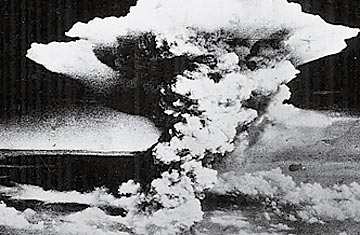
The greatest and most terrible of wars ended, this week, in the echoes of an enormous event—an event so much more enormous that, relative to it, the war itself shrank to minor significance. The knowledge of victory was as charged with sorrow and doubt as with joy and gratitude. More fearful responsibilities, more crucial liabilities rested on the victors even than on the vanquished.
In what they said and did, men were still, as in the aftershock of a great wound, bemused and only semi-articulate, whether they were soldiers or scientists, or great statesmen, or the simplest of men. But in the dark depths of their minds and hearts, huge forms moved and silently arrayed themselves: Titans, arranging out of the chaos an age in which victory was already only the shout of a child in the street.
With the controlled splitting of the atom, humanity, already profoundly perplexed and disunified, was brought inescapably into a new age in which all thoughts and things were split—and far from controlled. As most men realized, the first atomic bomb was a merely pregnant threat, a merely infinitesimal promise (see ATOMIC AGE).
All thoughts and things were split. The sudden achievement of victory was a mercy, to the Japanese no less than to the United Nations; but mercy born of a ruthless force beyond anything in human chronicle. The race had been won, the weapon had been used by those on whom civilization could best hope to depend; but the demonstration of power against living creatures instead of dead matter created a bottomless wound in the living conscience of the race. The rational mind had won the most Promethean of its conquests over nature, and had put into the hands of common man the fire and force of the sun itself.
Was man equal to the challenge? In an instant, without warning, the present had become the unthinkable future. Was there hope in that future, and if so, where did hope lie?
Even as men saluted the greatest and most grimly Pyrrhic of victories in all the gratitude and good spirit they could muster, they recognized that the discovery which had done most to end the worst of wars might also, quite conceivably, end all wars—if only man could learn its control and use.
The promise of good and of evil bordered alike on the infinite— with this further, terrible split in the fact: that upon a people already so nearly drowned in materialism even in peacetime, the good uses of this power might easily bring disaster as prodigious as the evil. The bomb rendered all decisions made so far, at Yalta and at Potsdam, mere trivial dams across tributary rivulets. When the bomb split open the universe and revealed the prospect of the infinitely extraordinary, it also revealed the oldest, simplest, commonest, most neglected and most important of facts: that each man is eternally and above all else responsible for his own soul, and, in the terrible words of the Psalmist, that no man may deliver his brother, nor make agreement unto God for him.
Man's fate has forever been shaped between the hands of reason and spirit, now in collaboration, again in conflict. Now reason and spirit meet on final ground. If either or anything is to survive, they must find a way to create an indissoluble partnership.
